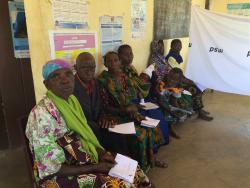10 New Steps Toward Eliminating Trachoma
On May 26, 2015, Helen Keller Intl proudly participated in an event marking another step toward the elimination of trachoma in Africa.
That sunny Tuesday saw the Mtwara Regional launch of the Trachoma SAFE Implementation Program funded by the UK Department for International Development and the Queen Elizabeth Diamond Jubilee Trust. Helen Keller serves as Coordinating Partner for this vital program and this event was just the first of six program launches which will take place in the targeted regions throughout Tanzania in the coming months.
Trachoma is most prevalent in high poverty communities and in the most disadvantaged households. Today, there is a real opportunity to eliminate blinding trachoma, as well as help eliminate avoidable blindness by 2020. Intervention programs like this can help protect more than 18 million people from blinding trachoma by providing high-risk communities with effective antibiotic treatments and surgeries.
There is a real opportunity to eliminate blinding trachoma, as well as help eliminate avoidable blindness by 2020.
Together with a local representative from the Ministry of Health and Social Welfare and the Neglected Tropical Diseases Control Program, our team traveled from Dar es Salaam south along the coast to the Namatutwe Health Center in the Masasi District.
After short speeches by visiting national, regional, and district level government officials and dignitaries, we watched some traditional Makonde cultural dances which contained educational messages for residents of Namatutwe Village about the importance of eye health.

But the most exciting feature for us was to see how many local residents lined up for voluntary screening for trichiasis, the blinding stage of trachoma. It was moving to see how our ongoing efforts around awareness and prevention were having an impact in this community.
From these screenings, more than 30 patients were identified. While some were given appointments to return later that week, 10 people were selected to undergo treatment surgery at the health center immediately following the launch event. Local surgeon Dr. Saadi Mbiro performed the procedures, which usually take less than 30 minutes, and invited us to observe.
Being part of a program that can provide access to much needed surgeries in poor communities and being able to see 10 new steps toward elimination was both inspiring and gratifying.









